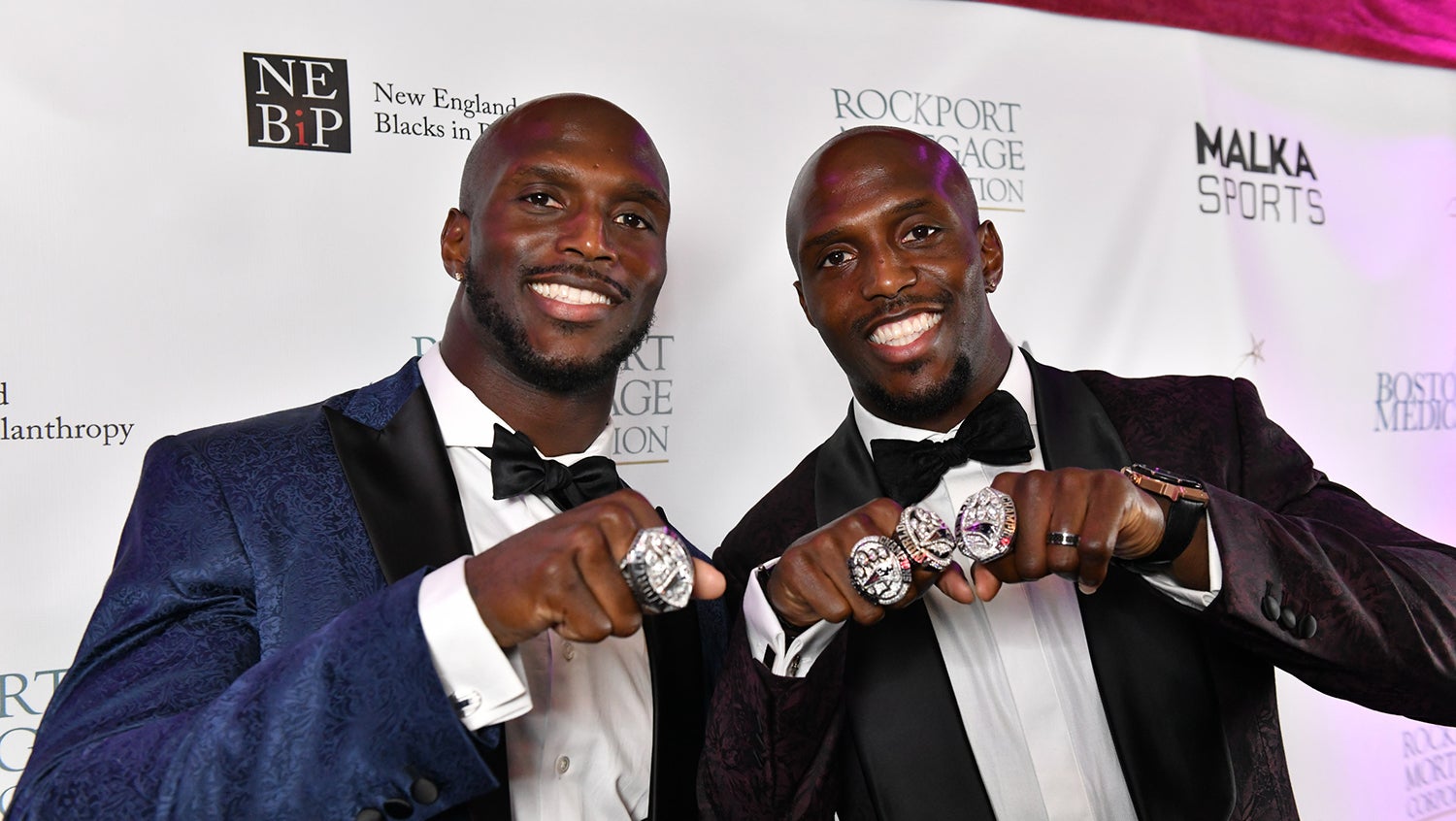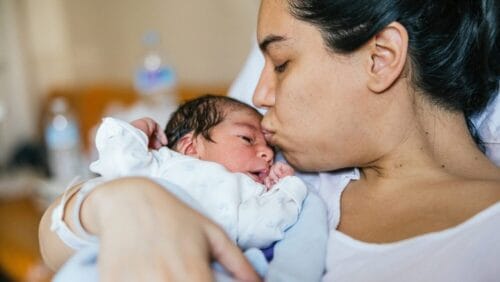'A Cure Affordable for All': What Drives Jason and Devin McCourty's Sickle Cell Disease Advocacy
August 30, 2022

Paul Horwitz of Atlantic Photo Service, Inc.
Inspired by their Aunt Winnie, the McCourty twins have made finding a cure for sickle cell disease a driving force of their life's work off the football field.
Sickle cell disease is considered the most prevalent inherited disease in the world. Debilitating pain episodes disrupt every aspect of life for patients with sickle cell disease (SCD), while the disease damages nearly every organ of the body; medical complications include blood clots, stroke, and heart disease. It’s common and costly: More than 100,000 Americans live with SCD, and 1 in 13 Black Americans carries the trait. Americans under 65 with SCD pay nearly four times more out-of-pocket medical costs in a lifetime than those without, and the estimated incremental economic burden of SCD was reportedly $2.98 billion per year in the U.S.
Despite sickle cell disease’s prevalence and severity, research funding lags behind other genetic disorders. After 50 years of research, only four FDA-approved drugs are available to treat sickle cell disease — none of which are curative. In addition, despite the debilitating pain episodes, the HHS states that Black Americans with SCD report fear of visiting the ED because of discrimination — specifically being accused of “drug-seeking behavior.”
There is no greater example of race-based health inequity than sickle cell disease.
For Devin and Jason McCourty, their sickle cell disease advocacy is driven by personal experience. Devin, a safety with the New England Patriots, and Jason, who recently retired from football and now broadcasts with NFL Network, understand that their professional success and stardom can’t insulate them from the harm of this disease that overwhelmingly affects Black Americans. Since 2017, the twins have helped raise more than $1.2 million through fundraising events to advance Boston Medical Center’s (BMC) care and research efforts.
The McCourty twins spoke with HealthCity about their work with BMC — which has the largest sickle cell center in New England, treating more than 600 patients annually — their goals, and their personal experience with SCD.
HealthCity: You’ve both been open about your Aunt Winnie, who passed away due to complications from sickle cell disease. What was it like growing up with a relative who lived with such a painful disease?
Jason McCourty: She was a person of faith and she was a Jehovah’s Witness. So, she didn’t believe in blood transfusion. So, her journey was even more complicated, dealing with sickle cell.
She talked to me and Devin about being a young girl and being in a hospital and a doctor telling her she wouldn’t live to see 35. We talked about the stigma around sickle cell, how it started out as a way of our bodies adapting and evolving to fight against malaria. My aunt and uncle both had the disease, and my father had the trait. My grandparents didn’t know they both carried this possibility. Once my aunt and uncle were born and they were suffering from a disease, they felt a sense of shame in not really wanting to tell anybody because they felt responsible for it. They felt awful about it and talked to my aunt about having cousins at the house and them not even sharing with other family members at times that they were going through that.

Aunt Winnie poses in her home (Courtesy of the McCourtys)
My aunt was such a fighter. Throughout her life, she was able to work, travel and see the world. Before she passed, she was on oxygen 24/7. She had lost eyesight in both of her eyes. She had hip surgery. She would get a common cold and be hospitalized for two weeks. And then she’d get leg sores from being bedridden for so long.
I think the thing that hurt the most was we would have hour-long phone conversations, and she’d try to describe the pain of what a sickle cell crisis was. The only way I could somewhat understand it is we’d be on the phone at times, and then she would just gasp for air because a pain would go through her body. And that was really the only time I could truly comprehend what she was going through.
As tough as it was for her, just her faith and her fight throughout her journey was definitely inspiration for Devin and me. Not only to do the work in sickle cell, but just continue to live our lives and not take things for granted and be grateful.
Devin McCourty: Her journey in healthcare was up and down. She lived in one area for a long time, and she would go to the same hospital and see the same doctors in Englewood, New Jersey. And that area had a lot of diversity. I think they dealt with more people who had sickle cell.

Devin and Jason McCourty with their Aunt Winnie (Courtesy of the McCourtys)
But she struggled big time when she moved to a city with less diversity. And doctors, for example, didn’t know how to accommodate her beliefs being a Jehovah’s witness. She always had anxiety about what her doctor was going to say no to. That taught us a lot about being your own advocate as a patient.
HealthCity: It’s clear why you’re involved in sickle cell disease fundraising and advocacy, but what drew you to Boston Medical Center specifically for your work?
DM: When I got to meet with BMC patients during my very first visit, I felt like a lot of the people in the hospital — patients and providers and everyone — I saw people who looked like me. I saw people getting help.
BMC’s vision for what they want to do within sickle cell and how they want to impact people, it aligned with everything I wanted to do.
HealthCity: What do you hope to accomplish with your SCD work?
DM: The sky is the limit. I think as a voice from the outside and not a healthcare professional, it’s just continuing making people’s lives better. With sickle cell, it’s being able to continue to be a part of discussion that brings a cure. Not just a cure that’s possible, but a cure that can be given to everyone, no matter how much money your mom and dad make, or if you don’t have the best-in-the-world health insurance. Just having a cure that’s accessible and people can be done with sickle cell.
That’s the biggest thing that I would love to be a part of.

The McCourty twins’ Aunt Winnie (Courtesy of the McCourtys)
It’s really about allowing people to live life without the fear of how sickle cell will impact their body — thinking, ‘what’s next that I’m going to have to deal with?’ I want young people to think ‘what am I going to accomplish next, what am I going to do with my life, how will I change the world, how will I be great?’
For so many young kids with sickle cell, it’s all about ‘what can I get done by this age, because I don’t know what’s after that.’ And I think changing that mentality to’ I have a life to live and I’m going to go do and be anything that I want,’ which we hope for all kids, I think it’s bringing that to kids with sickle cell disease. I think if that happened one day, I would be able to smile and be completely satisfied with the work that BMC has been able to do.
Simply put, in the future with BMC, I would love to see a cure affordable for all.
JM: Simply put, in the future with BMC, I would love to see a cure affordable for all and just continued improvement of quality life for any sickle cell patient, from young to old. I think that speaks to what Dev [Devin] just said: We met a college kid whose mom is talked to us and told us that her son thinks he has to get as much things done before he reaches 25, because he doesn’t know what’s going to happen after that.
Finding a cure affordable to all and continued improvement of quality of life for every sickle cell patient are the goals.
DM: Our aunt’s story is what’s inspired us to try to be a voice when it comes to sickle cell. It’s always been about her. Even when she hasn’t been able to attend events because of her health, there’s always a story about her being told from one of us. She’s the focal point.
This interview has been edited and condensed for clarity and length.


